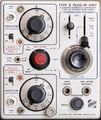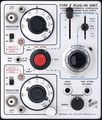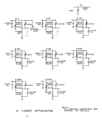Z: Difference between revisions
No edit summary |
No edit summary |
||
| (53 intermediate revisions by 6 users not shown) | |||
| Line 1: | Line 1: | ||
The Tektronix Type Z is a comparator plug-in for 500-series | {{Plugin Sidebar | ||
|manufacturer=Tektronix | |||
|series=500-series scopes | |||
|type=Type Z | |||
|summary=Comparator preamp plug-in | |||
|image=Tek Type Z front.jpg | |||
|caption=Type Z front view | |||
|introduced=1960 | |||
|discontinued=1969 | |||
|designers=Charlie Rhodes;Ron Olson | |||
|manuals= | |||
* [[Media:070-251.pdf|Tektronix Type Z Manual]] (OCR) | |||
* [[Media:tek_type_z_fcp.pdf|Tektronix Type Z Factory Calibration Procedure]] | |||
* [[Media:Tek type z cal outline.pdf|Tektronix Type Z Calibration Outline]] (OCR) | |||
}} | |||
The '''Tektronix Type Z''' is a comparator plug-in for [[500-series scopes]], [[introduced in 1960]] and dropped after 1968. | |||
It was designed by [[Charlie Rhodes]] and [[Ron Olson]]. | |||
* http:// | The Type Z has two inputs, A and B, plus a precision comparison voltage, V<sub>C</sub>, that is | ||
adjustable from 0 to ±1 V, 10 V, or 100 V via a ten-turn pot. | |||
The following differential amplifier can be configured to display V<sub>A</sub>, −V<sub>B</sub>, | |||
V<sub>A</sub>−V<sub>B</sub>, V<sub>A</sub>−V<sub>C</sub>, or V<sub>C</sub>−V<sub>B</sub>. | |||
This allows DC-coupled measurements of small signals with large DC offsets. | |||
Unlike later comparators, Type Z has separate step attenuators for each input, | |||
permitting the user to view the difference between signals of widely differing amplitudes. | |||
Unfortunately the divider resistors have no trim, so CMRR is poor except at 50mV/div. | |||
It is also the only comparator that can handle ±100 V common mode at full sensitivity. | |||
With a pair of "Disconnect Signal" buttons, the Type Z was the first | |||
movement toward a "GND" position on the input switches. | |||
The Type [[P6023]] probe with R and C compensation, [[introduced in 1962]], | |||
was specifically designed for the Type Z but also marketed for the Type [[G]]. | |||
==Specifications== | |||
Maximum sensitivity is 50 mV/div, and common-mode rejection is 40,000:1 "from DC through audio frequencies". | |||
Risetime as a general-purpose amplifier is 27 ns (13 MHz bandwidth). A side effect of Type Z's unprecedented dynamic range is that transient response is a function of signal amplitude: slew rates faster than 1V in 6ns will cause distortion due to grid current. | |||
[[Category:Specifications needed]] | |||
==Internals== | |||
The Type Z uses both tubes and transistors, capitalizing on the strengths of each. | |||
The step attenuators are [[turret attenuators]]. | |||
==Prices== | |||
* $525 in 1962 (~$5,300 in 2023 dollars) | |||
==Links== | |||
* [http://www.amplifier.cd/Test_Equipment/Tektronix/Tektronix_other/Z.html Type Z @ amplifier.cd] | |||
==Pictures== | |||
<gallery> | |||
Tek Type Z front.jpg |Front view | |||
Tek z front.jpg|3/4 View | |||
Tek z 1.jpg| Front View | |||
Tek z 7.jpg | Front View | |||
Tek type z pre-prod.jpg|Pre-production Type Z with different knob color | |||
Tek z left.jpg|Left Side | |||
Tek z 5.jpg | Left Side | |||
Tek_TypeZ-RHS.jpeg | Right Side | |||
Tek z 2.jpg | Right Side | |||
Tek z 3.jpg | Right Side | |||
Tek z 6.jpg | Right Side Tubes | |||
Tek_TypeZ-Top.jpeg | Top | |||
Tek z 4.jpg | Rear | |||
Tek type z front2.jpeg | |||
</gallery> | |||
===Schematics=== | |||
<gallery> | |||
Tek_z_turret.png|Attenuators | |||
Tek_z_schem.png|Main Amplifier | |||
</gallery> | |||
==Components== | |||
{{Parts|Z}} | |||
[[Category:500 series plugins]] | |||
[[Category:Differential amplifiers]] | |||
Latest revision as of 08:24, 6 December 2023
The Tektronix Type Z is a comparator plug-in for 500-series scopes, introduced in 1960 and dropped after 1968. It was designed by Charlie Rhodes and Ron Olson.
The Type Z has two inputs, A and B, plus a precision comparison voltage, VC, that is adjustable from 0 to ±1 V, 10 V, or 100 V via a ten-turn pot.
The following differential amplifier can be configured to display VA, −VB, VA−VB, VA−VC, or VC−VB.
This allows DC-coupled measurements of small signals with large DC offsets.
Unlike later comparators, Type Z has separate step attenuators for each input, permitting the user to view the difference between signals of widely differing amplitudes. Unfortunately the divider resistors have no trim, so CMRR is poor except at 50mV/div.
It is also the only comparator that can handle ±100 V common mode at full sensitivity.
With a pair of "Disconnect Signal" buttons, the Type Z was the first movement toward a "GND" position on the input switches.
The Type P6023 probe with R and C compensation, introduced in 1962, was specifically designed for the Type Z but also marketed for the Type G.
Specifications
Maximum sensitivity is 50 mV/div, and common-mode rejection is 40,000:1 "from DC through audio frequencies".
Risetime as a general-purpose amplifier is 27 ns (13 MHz bandwidth). A side effect of Type Z's unprecedented dynamic range is that transient response is a function of signal amplitude: slew rates faster than 1V in 6ns will cause distortion due to grid current.
Internals
The Type Z uses both tubes and transistors, capitalizing on the strengths of each.
The step attenuators are turret attenuators.
Prices
- $525 in 1962 (~$5,300 in 2023 dollars)
Links
Pictures
-
Front view
-
3/4 View
-
Front View
-
Front View
-
Pre-production Type Z with different knob color
-
Left Side
-
Left Side
-
Right Side
-
Right Side
-
Right Side
-
Right Side Tubes
-
Top
-
Rear
-
Schematics
-
Attenuators
-
Main Amplifier
Components
Some Parts Used in the Z
| Part | Part Number(s) | Class | Description | Used in |
|---|---|---|---|---|
| 0G3 | 154-0291-00 | Gas Discharge Tube (Voltage regulator) | 85 V voltage reference | 132 • 506 • 547 • 560 • 561 • 561A • 561S • 564 • 565 • 567 • 661 • TU-4 • Z |
| 12AT7 | 154-0039-00 | Vacuum Tube (Dual Triode) | dual high-gain triode | 161 • 180 • 310 • 310A • 315 • 316 • 360 • 502 • 502A • 511A • 512 • 513 • 513D • 514 • 514AD • 514D • 516 • 524 • 529 • RM529 • 544 • 546 • 547 • 556 • 565 • 570 • 3A2 • 75 • 3A75 • 1M1 • A • B • C • G • H • K • L • ML • M • N • K • R • S • Z |
| 12AU6 | 154-0040-00 | Vacuum Tube (Pentode) | RF pentode | 81 • 112 • 1L10 • 1L20 • 1L60 • 3L10 • 512 • 556 • 575 • 545 • 547 • 549 • 581 • 585 • A • B • C • G • K • H • L • ML • M • N • O • R • S • Z |
| 6AK5 | 154-0014-00 • 154-0206-00 • 154-0084-00 | Vacuum Tube (Pentode) | RF pentode | B • C • CA • G • K • L • ML • S • Z • 517 • 517A • 524 |
| 6DJ8 | 154-0187-00 • 154-0305-00 | Vacuum Tube (Dual Triode) | dual triode | 132 • 161 • 310A • 316 • 317 • 502 • 502A • 503 • 504 • 506 • 515 • 516 • 519 • 526 • 529 • RM529 • 533 • 535 • 536 • 543 • 544 • 545 • 545A • 545B • 546 • 547 • 549 • 555 • 556 • 561A • 561S • 564 • 565 • 567 • 581 • 581A • 585 • 585A • 661 • 1A4 • 1S1 • 60 • 2A60 • 63 • 2A63 • 67 • 2B67 • 3A1 • 3A1S • 3A2 • 3A3 • 3A6 • 3A7 • 72 • 3A72 • 75 • 3A75 • 4S2 • 51 • 3B1 • 3B1S • 3B2 • 3B3 • 3B4 • 3M1 • 3S76 • 3T77 • 3T77A • 9A1 • 9A2 • 1121 • 80 • 81 • 82 • 86 • B • O • W • Z • Telequipment D56 • Telequipment S32A • Telequipment D52 • S-311 • Telequipment TD51 • Telequipment S52 • Telequipment S51 • Telequipment Type A • TU-4 |
| RT5204 | 151-0058-00 | Discrete component | Silicon NPN transistor | 565 • RM565 • Z • 2A61 • 3B1 • 3B3 • 3S76 • 3T77 |
















